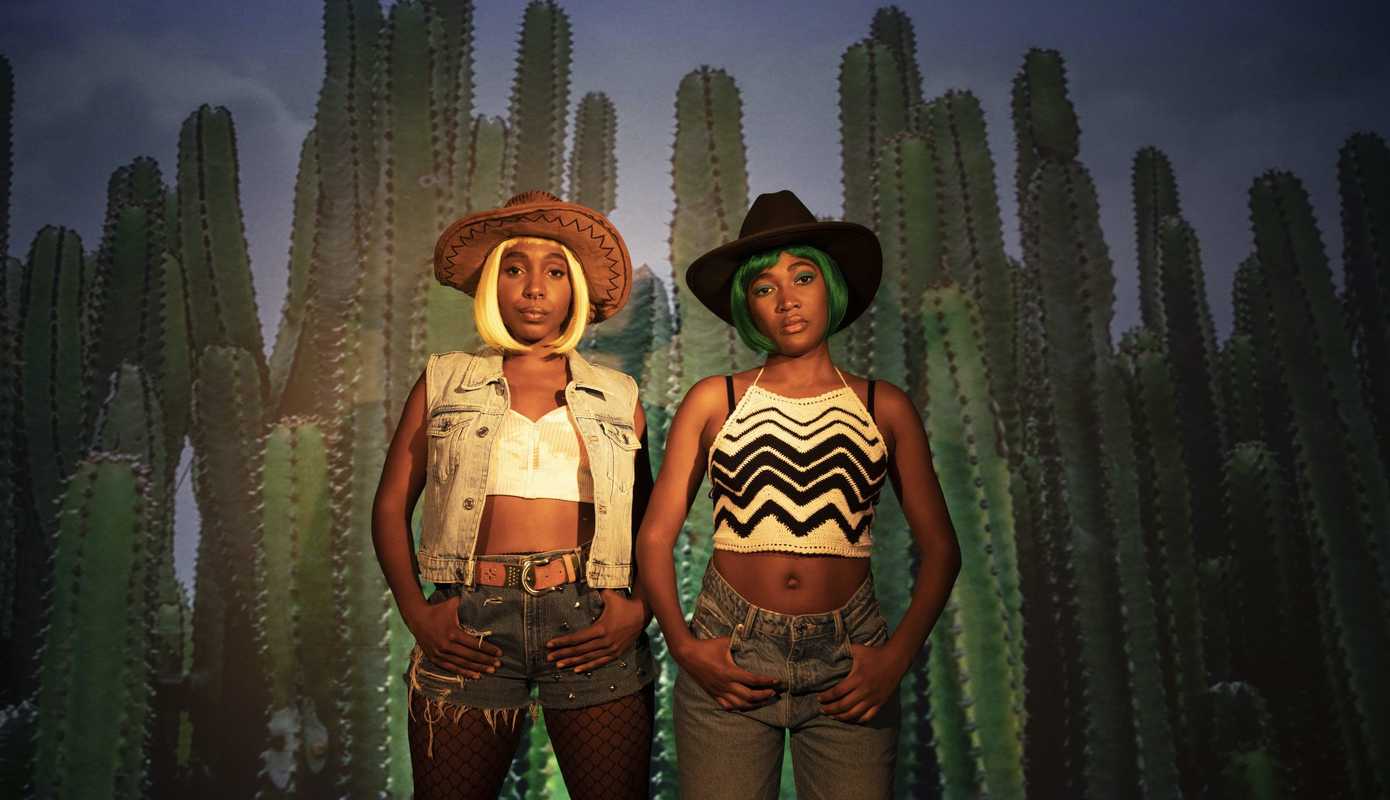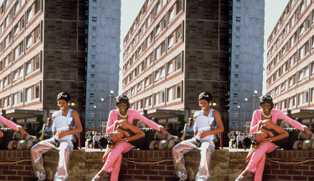Violence permeates Is God Is. It transmutes across time and space, genre pushing against genre, protagonists both victims and perpetrators, both good and bad, and neither. The play follows twins Racine and Anaia, abandoned by their parents in infancy and now as adults making a cross-country trip to see their mother – God – on her deathbed. A journey of revenge ensues, reminiscent of both Greek tragedy and American Western, and the play becomes a fevered meditation on two women’s capacity for violence, a test of limitations in a world that has already defined violence against them as inevitable.
“Its meaning is subjective in any moment,” playwright Aleshea Harris tells me in our conversations over Zoom and email. “Right now, for me, it retains its importance as a tale of women who fight for themselves and each other.”
When Is God Is first opened at New York’s Soho Rep in 2018, North America had an appointed super villain, an impossible yet legitimate president, whose capacity for evil was rendered cartoonishly large. It is embarrassing really, both then and in hindsight, how systematically violent institutions – news media, social commentators, capital-driven politicians, and the like – were so intent on naming that violence as an aberration. Both then and now, Is God Is asks us to consider how such a system, one that denies its own capacity for immorality, can shape possibility for those it oppresses.
Racine and Anaia begin in “New York or Hampshire or Jersey… somethin’ like that,” and journey toward their mother in “Oscarville, MS/AL/FL/TX/TN/AR/KY, Dirty South.” The geographic imprecision feels important, allegorical of well-documented Black American migration patterns. While Harris says this was unintentional, I cannot ignore the realities of Black death that often precipitated these movements. Is God Is, in this way, is a distinctly American play. The twins’ journey – their birth, neglect, and their eventual quest for retribution – unfolds in the fallout from America’s original sins, horrors that made the idea of home an unstable one, and shaped a world of quotidian violence for Black people.
The play challenges us to consider where violence actually begins. Before the twins are murderers, bludgeoners by rock-filled sock, they are victims of abuse and acute abandonment. Before their father can achieve his own American Dream – a wife, two kids and a house in the suburbs – he must practice extermination, intentionally maiming his wife and daughters by burning his first family home to the ground. The violence of Is God Is is that of its country: it is the driving force and is infinitely transferable.
Want to support more writing like this? Become a Skin Deep member.
Being a Black storyteller, someone whose job it is to conjure life, is a challenging practice in a country that is well-practiced at killing people like you. I cannot help but think of how the country’s original sins permeate American theatre, how whiteness’ enduring sovereignty in the industry works to shape and limit the kinds of stories it tells about Blackness. How does Harris approach her practice, given this awareness?
“Our ideas, our bodies, our missions,” she tells me, “will always be more expansive, more nuanced, more surprising than the confines of a white supremacist imagination will allow for.” To exist in their fullness, they must always push beyond what hegemony deems possible. It is not that Harris denies the pervasiveness of a white gaze, it is that she has little care or concern for it. “Whiteness will always pervert us,” she continues. “I try and write for my whole self – weird, dark, playful – and hope the like-minded will feel affirmed.”
Harris is a master at world-building. Her tone is sharp, her pacing nimble, and her reach across genre builds a reality aware of its own epic and irrevocable tangled-ness. As we speak, Harris recalls her grad-school mentor, poet and librettist Douglas Kearney, who reminded her that anything she’s interested in is worthy of exploration.
“It’s that simple,” she says, “Black people can and should write about anything. We must, as makers, stand beside our work but no genre or framing is off-limits.”
And what does such an approach, one with aspiration and audacity at its centre, make possible for the playwright? I ask about the process of writing a play like Is God Is, what it felt like, what it required. “Sometimes I feel I need to go through something spiritually in order to be ready to crack something open in a play,” Harris says, “perhaps there’s something I need to confront.”
Finishing a play and getting it produced is a feat, it is what all playwrights want and covet, but the process of writing a play is a journey. How you talk to yourself when you write, how the writing frustrates you, the moment it begins to flow, when it forgets its purpose to entertain some future audience and instead becomes the writers’ own act of service, guiding her toward an internal truth or revelation that exists beyond the 90 minute story. The practice of writing for oneself is its own storied life cycle, and Harris recognises this. Despite working in industries driven by capitalist modes of producing, Harris believes in the importance of taking her time.
“My plays don’t care about deadlines,” she explains. “Their chief concern is that I am honest and rigorous. I like to say that a story ‘takes what it takes.’ I am slow in part because I am so meticulous.”
Aleshea Harris is the kind of artist who, in all of her work, reminds me that art-making can be spiritual. Our conversations are a balm; they affirm to me that this work can be self-edifying, that it has the potential to teach us about our own depths, as well as the world’s. Before we end our conversation, I tell Aleshea about my relationship with my own writing. I talk about the ways my own experiences – of grief, of death, of unmitigated joy – shape how I come to the work. I tell her that not always, but enough of the time, writing feels like a metaphysical act, like an attempt to draw together the many realities, many timelines that, through inheritance, through embodiment, through madness, exist all at once. I have been thinking about spirits so much this past year, I tell her, and what they make possible.
“I think they dwell within us,” Aleshea says. “In the blood. They remind us to walk a certain way.”
Catch Is God Is at the Royal Court until 23rd October.
Stay in touch. Subscribe to Skin Deep’s monthly newsletter.




